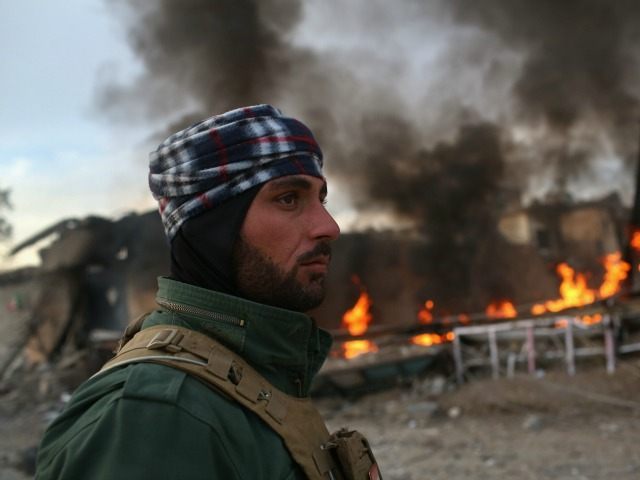Russian Foreign Minister Sergei Lavrov saluted Kurdish efforts against the Islamic State, and offered Moscow’s support, by way of Damascus.
“We know very well that there are Iraqi and Syrian Kurds that are fighting against the Daesh threat on the ground,” Lavrov said at a Moscow press conference with Selahattin Demirtas, leader of the pro-Kurdish People’s Democratic Party of Turkey (HDP), as reported by Rudaw. “They are fighting for their right to live in their homes and for their right to live in their own land, with Iraqi and Syrian armies.”
That is a reference to the Syrian army loyal to dictator Bashar Assad, whose ouster has long been a policy goal of the U.S. and other Western powers.
“Of course, this is their essential right. They have rights, just like Christians, Yezidis and other minorities have the right to stay in their own land, to live in the land of their ancestors,” Lavrov continued, declaring that Moscow stands ready to support anyone who battles the Islamic State as part of Russia’s “counter-terrorism operation with the Syrian administration.”
It is not difficult to find Syrian Kurds who think destroying ISIS is far more important than toppling Assad, if they are interested in toppling Assad at all. The Kurds are the linchpin of Western strategy against the Islamic State, but Russia is making a strong bid for their attention.
Rudaw points out that Russia has stopped short of endorsing the HDP, or allowing them to formally open an office in Moscow, but warm reception given to Demirtas is already causing friction with the Erdogan government. Turkey’s Deputy Prime Minister, Yalcin Akdogan, is quoted demanding to know why the HDP is “running towards any country that has problems with Turkey, instead of being on the side of their country to say, ‘How can we help?'”
As Reuters put it, while reporting on Demirtas’ visit to Moscow, Russia is “keenly aware of the sensitivity of Ankara to any contacts between Moscow and Kurdish politicians,” but they are having such contacts, anyway. Demirtas – whose visit is the highest-level diplomatic contact between Turkey and Russia in a month – jumped right into the hottest issue between Turkey and Russia by criticizing his own country for shooting down a Russian fighter in November.
“We criticized the actions of the government when the Russian plane was shot down,” said Demirtas. “From the very first days, we declared as an opposition party in the country, that we do not support the position of worsening relations with Russia.”
An infuriated Prime Minister Ahmet Davutoglu charged that Demirtas’ statement in Moscow was “exactly scandalous and exactly treason.”
“During a process when Russian airplanes have been bombing innocent Turkmens, innocent Arabs and innocent Kurds in Azaz, Aleppo, Idlib and Bayırbucak, running toRussia and declaring support is openly betraying the nation. This is naked carelessness,” Davutoglu continued, as quoted by Turkish Weekly.
The HDP responded to Davutoglu’s response by calling his charge of treason “unacceptable and inconsistent.”
Reuters cites a Stratfor analysis that suggests Russia is shrewdly using the Kurds as a “pressure point” against Turkey, letting them know Demirtas and his party are “a political force that cannot be sidestepped in elections or crushed in the streets.”
Turkey has long maintained that the best way to end the bloody Syrian civil war is to kick Assad and his entourage out of Damascus. Turkey also fears the possible emergence of a greater Kurdish state, far more than they worry about the Islamic State. Russia wants to end the Syrian civil war by consolidating Assad’s rule and wiping out the terrorist-infested opposition, after which short work can be made of the Islamic State. Lately, the Russians have been approving of the Kurds, irritating Turkey.
If the relationship between Turkey and Russia does not improve soon, maybe we will hear a few thoughts from Russian officials on the subject of Greater Kurdistan, or the Russian law supposedly prohibiting the HDP from opening an office in Moscow might be interpreted in interesting new ways.

COMMENTS
Please let us know if you're having issues with commenting.